
Londoners outperformed the rest of Britain at social distancing
London was better at following social distancing rules than the rest of Britain during the sweltering summer months, new data has revealed.
Anonymous mobile phone movement data collected by Google revealed that as the rest of the country was opening up after months of draconian lockdown measures, Londoners remained cautious.
While revellers flocked to bars, restaurants, non-essential shops and offices in the rest of the UK between July and early September, Londoners instead opted to stay inside or take advantage of socially-distanced outdoor spaces, the figures suggest.
The difference may account for London's comparatively lower coronavirus hospitalisation numbers - and its already-ebbing second wave stats.
In the summer months, visits to newly-reopened venues were between 50 and 30 per cent less popular than they were before lockdown in London.
The rest of the UK were between 40 and 10 per cent less busy, analysis by the Daily Telegraph has found.
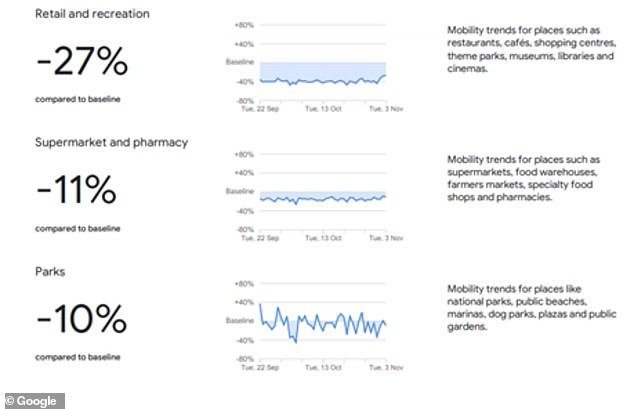
London saw a 27 per cent drop in the number of people visiting retail and recreation facilities compared to pre-lockdown figures between September and November
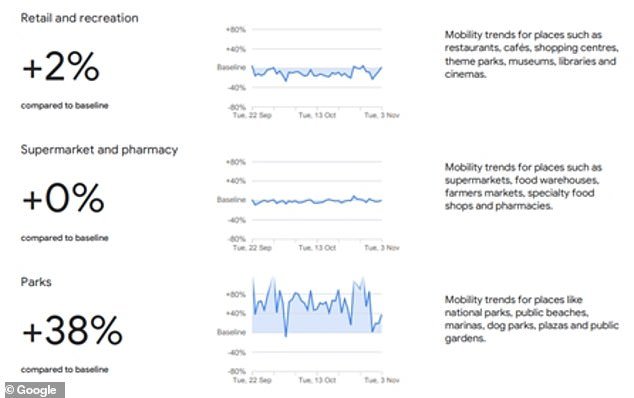
North Yorkshire also saw an increase of 2 per cent on pre-lockdown numbers between September and November
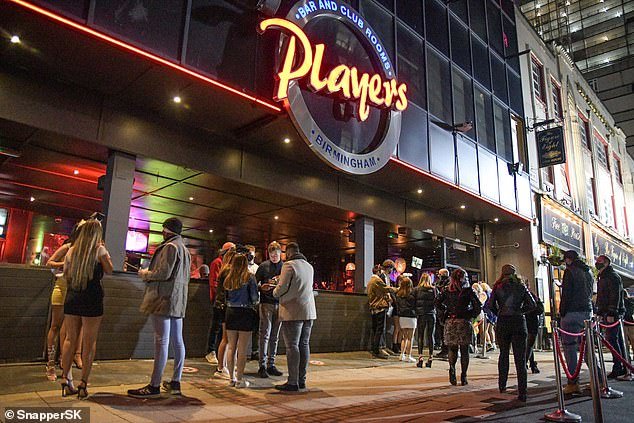
Revellers descended on to Broad Street in Birmingham wearing Halloween fancy dress last month
The contrast is likely down to lifestyle differences in London - with the capital seeing different patterns in working and commuting which make adhering to social distancing less difficult.
This data corroborates similar figures released in September which showed a 69 per cent drop in the number of people visiting non-essential shops in London - compared to northern cities where the dip was much smaller.
Less than 150 people per 100,000 are hospitalised with coronavirus in London.
In the North-West and Yorkshire and the Humber, the figure stands at around 400 per 100,000 - however many factors may play into these differences.
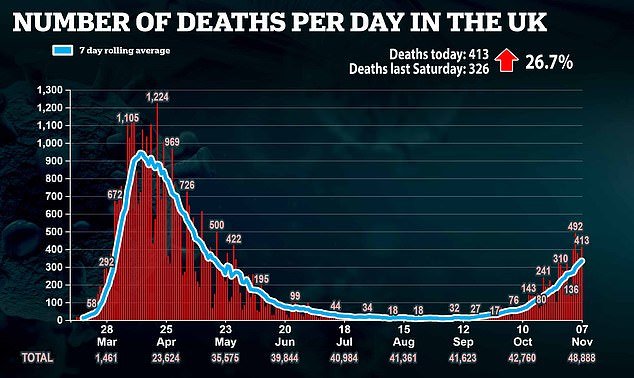
A further 413 people have died after testing positive for the virus, official figures released yesterday revealed, bringing the UK's total death toll during the pandemic to 48,888
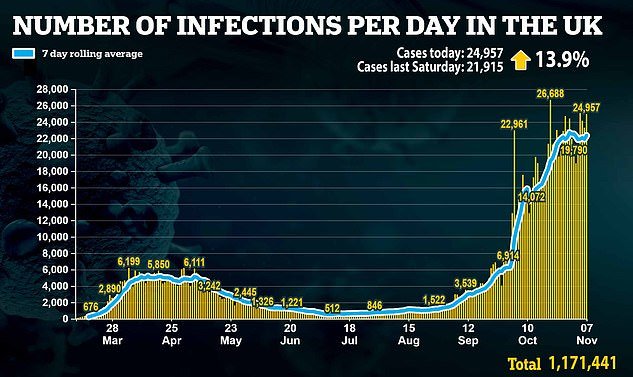
The UK confirmed a further 24,957 positive Covid tests, up just 13.9 per cent on last week's total, yesterday
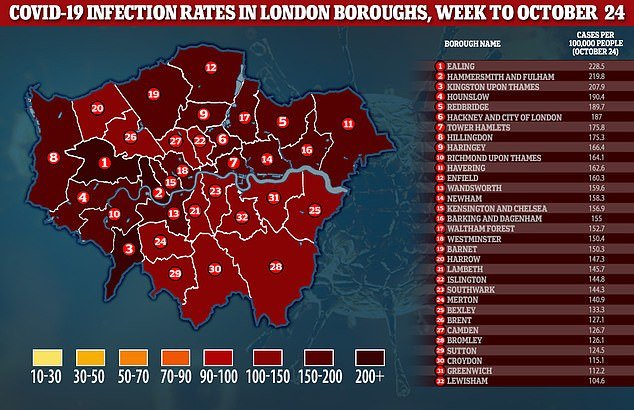
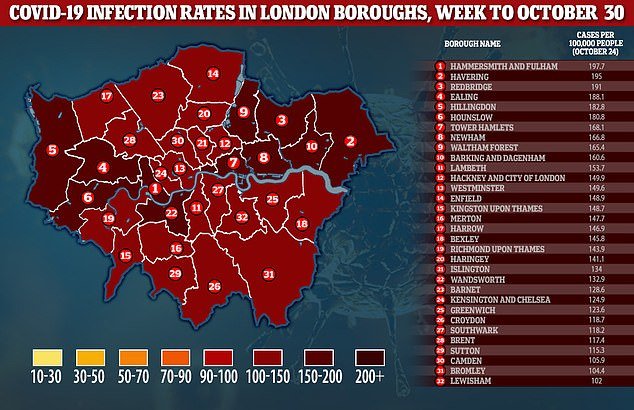
Policy and strategy analytics academic at Loughborough University said: 'London is a young city.
'Many Londoners may be able to work from home, decreasing mobility and risk.
'Some Londoners do not have that privilege, being key workers who cannot avoid the use of public transport, increasing their risk.'
However he warned that intensive care figures remain high in the capital.
And the trends follow through between September and November.
While London saw a 27 per cent drop in the number of people visiting retail and recreation facilities compared to pre-lockdown figures - Cornwall saw an increase in footfall of 14 per cent.
North Yorkshire also saw an increase of 2 per cent on pre-lockdown numbers.
The West Midlands - which includes major cities such as Birmingham - saw a drop of just 12 per cent in the same category.
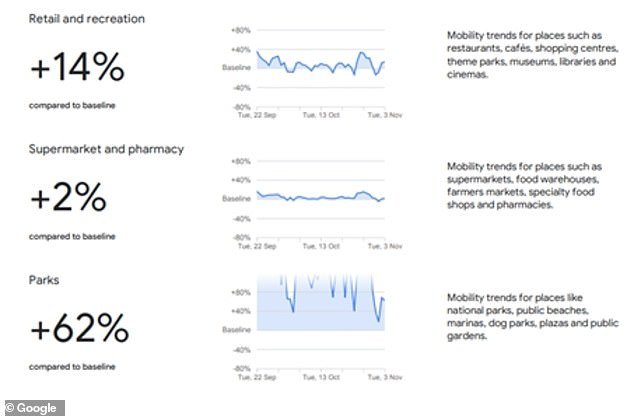
While London saw a 27 per cent drop in the number of people visiting retail and recreation facilities compared to pre-lockdown figures - Cornwall saw an increase in footfall of 14 per cent between September and November
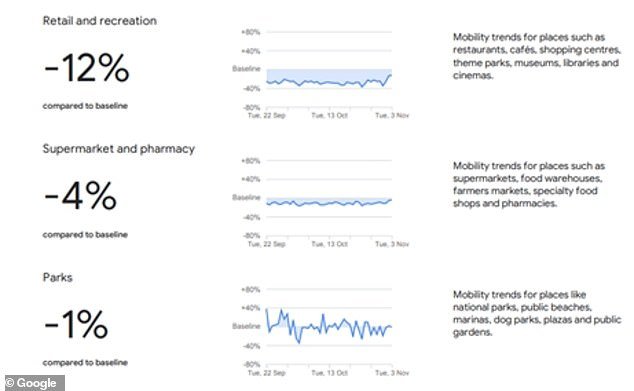
The West Midlands - which includes major cities such as Birmingham - saw a drop of just 12 per cent in the same category between September and November
Earlier this week, it was revealed that London's second wave of coronavirus had already started to slow down before the national lockdown forced workers to stay at home and high street shops to pull down the shutters.
More than half of the capital's 32 boroughs - including the three hotspots of Ealing, Hammersmith and Fulham, and Kingston upon Thames - saw infections fall in the week ending October 30.
The city's overall infection rate also declined from 152 to 146 cases per 100,000 people over the same period, according to weekly data from Public Health England.
The stark figures raise questions over whether London and its nine million residents could have been spared a second lockdown, had over-zealous officials kept their fingers off the panic button for another more week.
Officials possess only two weeks of accurate infection data from when the city's Tier Two restrictions - banning households mixing indoors - were imposed.
But experts say it can take at least three weeks before it becomes clear whether the restrictions have driven down the rise in infections.
Liverpool, Lancashire and Manchester - all previously under the toughest Tier Three curbs - also saw sharp falls in infection rates, sparking suggestions the Government's knee-jerk reaction came too soon and should have been delayed. Boris Johnson even admitted yesterday that the Tiers were working before the crunch vote.
London mayor Sadiq Khan said 'thanks to the efforts of Londoners we are seeing initial signs that the increase in infections across the capital has started to slow down' but he warned cases still remained high and the number of patients in hospital continues to rise. Data shows there are currently only 990 people in hospital with Covid-19 in London, miles away from the almost 5,000 infected patients on wards at the peak of the first wave.
Conservative London mayor candidate Shaun Bailey said Mr Khan must now 'stop demanding more restrictions', warning Londoners 'won't forgive him if their favourite restaurants and businesses fail to make it through the restrictions he shouted so loudly for'.
The mayor was slammed for his over-zealous decision to push the city into Tier Two, while other regional authorities fought with the Government to negotiate concessions.










